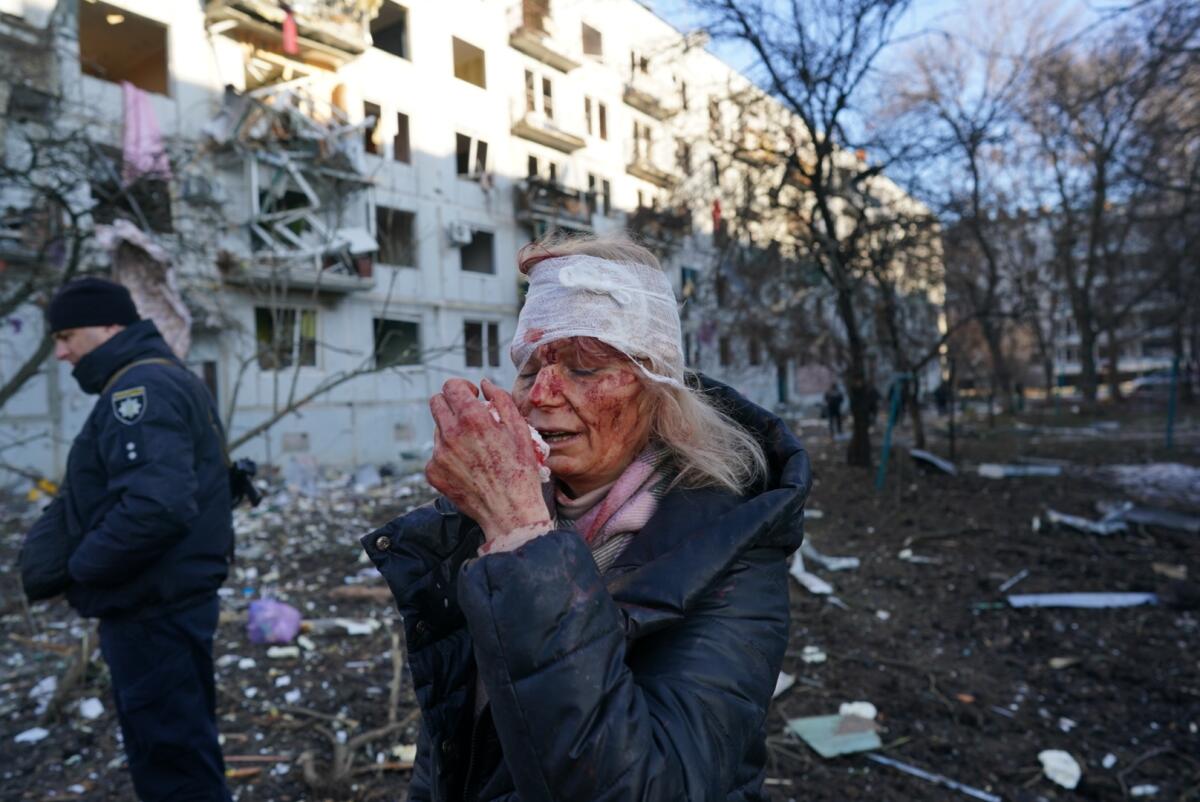The U.S. couldn’t stop Russia from attacking Ukraine — but it can make it pay

- Share via
The most conspicuous victims of Russia’s unprovoked invasion of Ukraine are the people who will lose their lives in defending their country against a brutal (and nuclear-armed) neighbor. But Vladimir Putin’s decision to launch a many-pronged attack — an audacious operation the United States predicted but was unable to prevent — is also a devastating assault on international norms and potentially a harbinger of a wider war in Europe.
This week’s attack fully justifies the significant sanctions the U.S. and its allies are moving to impose on Russia. Sadly, it’s not clear whether these measures will cause Russia to relent in its aggression against Ukraine. They may, however, put Putin on notice that Russia’s economy, and its “corrupt billionaires,” will pay a heavy price for this act of aggression — and an even steeper cost if Russia were to menace a member state of NATO.
On Tuesday, President Biden indicated that sanctions would be ratcheted up to match Russian escalation in Ukraine. On Thursday, he made good on that commitment, unveiling new sanctions that would impose real hardships on Russia and members of its ruling elite — but not on Putin directly, though Biden said that is still an option. Russian banks and companies would be cut off from access to the U.S. financial system and restrictions will be imposed on the export of U.S.-made technologies to Russia.
The West is imposing sanctions on Russian financial institutions, but it might take more to tame the Ukraine crisis.
Regrettably, the measures did not include a move to exclude Russia from participation in the Society for Worldwide Interbank Financial Telecommunication, or SWIFT: a consortium whose secure network enables financial institutions to complete transactions by their customers.
Biden said in a speech Thursday that targeting Russian participation in SWIFT “is always an option, but right now that’s not the position that the rest of Europe wishes to take.” The president suggested that the other sanctions he unveiled were “of equal consequence — maybe more consequence than SWIFT.”
The sanctions were designed to “maximize the long-term impact on Russia,” Biden said, noting that the measures would “strike a blow to their ability to continue to modernize their military” and “be a major hit to Putin’s long-term strategic ambitions.”
We can hope, as Biden surely does, that by punishing Russia economically the U.S. and its allies can pressure Putin into cutting short his war in Ukraine. But Putin knew an invasion would likely result in such sanctions, and he attacked anyway. (Indeed, in a rambling, bitter speech on Monday the Russian president described the sanctions as “blackmail” and said their only purpose was to “restrain the development of Russia.”)
But Biden was thinking not only about Ukraine when he said Thursday that new sanctions would rein in “Putin’s long-term strategic ambitions.” The president stressed that “we’re also taking steps to defend our NATO allies, particularly in the east.”
It would be ironic if Russian aggression against Ukraine, supposedly motivated by a fear that Kyiv might someday join NATO, resulted in greater solidarity among the countries that already are part of the alliance.
More to Read
A cure for the common opinion
Get thought-provoking perspectives with our weekly newsletter.
You may occasionally receive promotional content from the Los Angeles Times.










